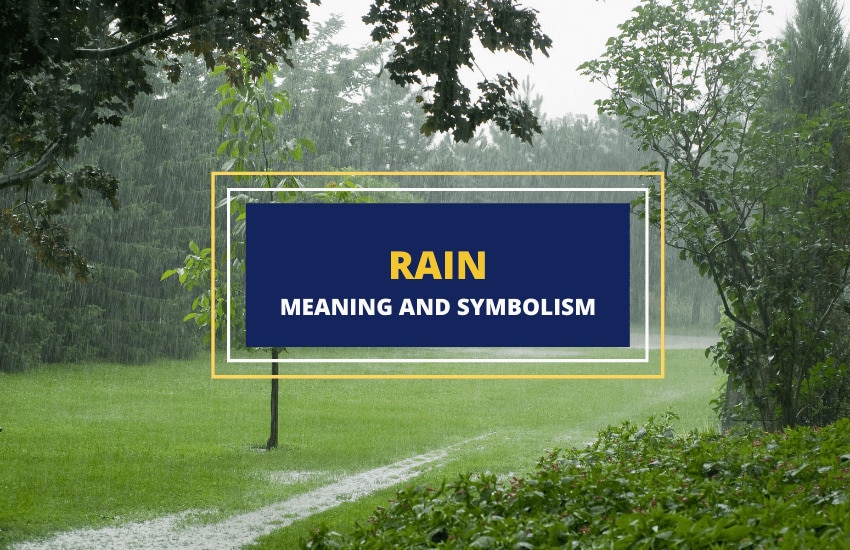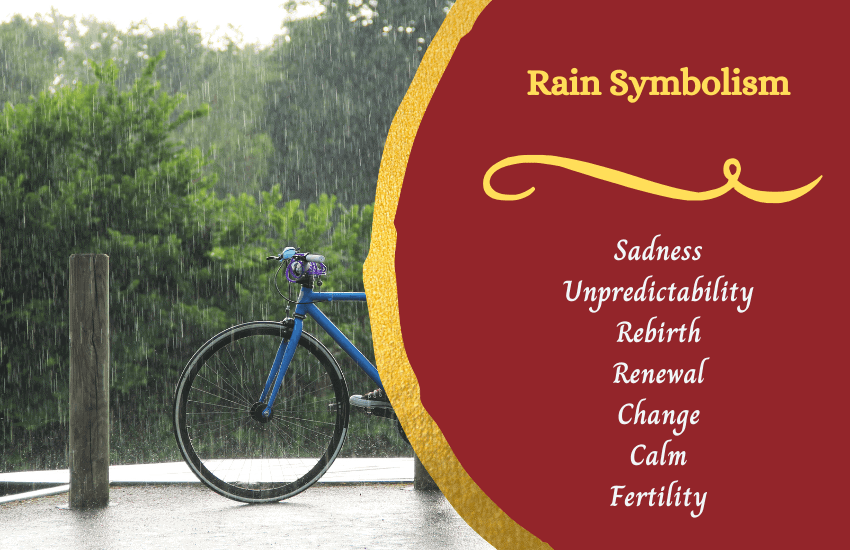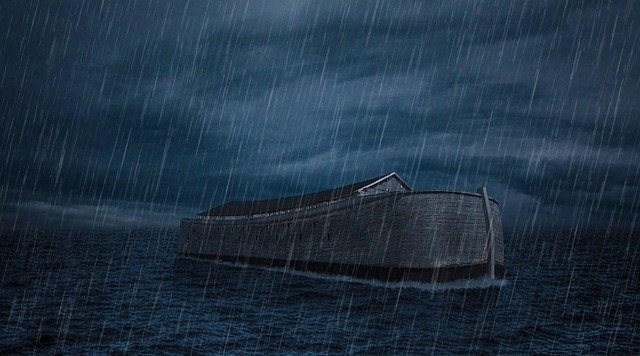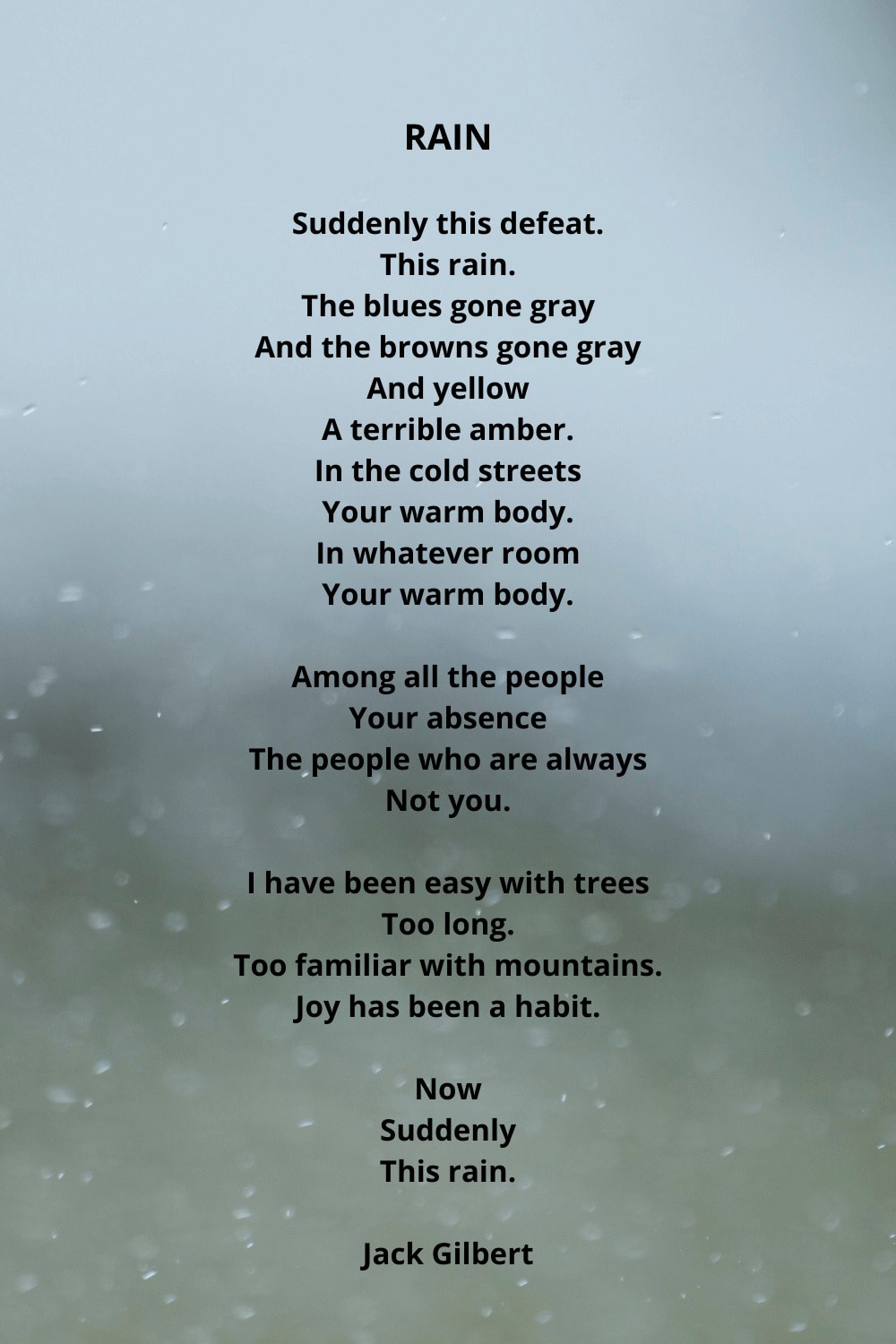
Table of Contents
Rain has always held great symbolism for humans. As a natural phenomenon that’s crucial for life on the planet, rain has both positive and negative connotations.
Rain and Human Life
Rain forms when clouds become saturated with water droplets, with each droplet bumping into each other and forming dark clouds. Water from oceans, lakes, and streams continues to evaporate, leading to more and more droplets condensing into each other. When they get too heavy to stay suspended in the clouds, they fall to the ground as rain.
Rain is considered one of the most important components of the water cycle because it deposits freshwater on Earth. This makes the Earth a suitable environment for different types of ecosystems. Rain provides all living things with water to drink and powering modern agriculture and hydroelectric systems. The role of rain in sustaining life on Earth could be the reason why ancient people even had rituals that were meant to bring rain.
Symbolism of Rain
Rain has both positive and negative connotations. These include the following:
- A Loss of Joy – Unlike sunny weather, rain can feel oppressive, gloomy, and joyless. Rain can have a significant effect on people’s mood, as most people often feel unhappy and sad when it rains.
- Unpredictability – As an aspect of weather, the rain is unpredictable and sometimes unexpected. It’s viewed as a random event and therefore, signifies unpredictability, flightiness, and randomness.
- Rebirth and Renewal – Rain assists vegetation to grow and is a necessary aspect of the cycle of life. This associates it with life, renewal, growth, and new beginnings. Rain on a wedding day is seen as good luck, as it can indicate a new chapter of a successful marriage.
- Change and Cleansing – As water that falls from the sky, rain is seen as a natural cleanser. It’s often used as a metaphor for the cleansing of sins and negativity.
- Calmness – When it rains, there’s a sense of calm and relaxation. No wonder the sound of rain is often used in meditation, sleep, and study music. Listening to the sounds of water drops falling on roofs, plants, or the ground is pleasant and rhythmic.
- Fertility – As mentioned above, rain is necessary for the sustenance of life. A lack of rain results in drought and death. This associates rain with fertility and growth.

Rain in Mythology
People in ancient civilizations used to attribute different elements of nature to certain gods and goddesses. Almost every civilization around the globe had some deity or personification of the rain and other natural phenomena associated with it.
For example, in Greek mythology, Zeus was the god of rain, thunder, and lightning, while in Norse mythology it was Freyr who was seen as the deity of rain. In Hindu mythology, this position was held by the powerful god Indra.
This faith in gods and goddesses made ancient people believe that changes in the weather were related to the mood of the gods and that people could be punished for their misdeeds with drought, storms, and devastating floods.

Rain has also featured in the Bible, most notably in the story of Noah and the Ark. God sends a deluge to destroy humanity and rid the world of their sins. In this story, rain served as a symbol of two things:
- The power to destroy a world full of sinners
- Bringing in a wave of change that Noah and the rest of the survivors brought upon the world
This presents a distinct dichotomy between the rain being a destructive force and a restorative force.
It’s interesting to note that the flood myth, caused by endless rains and instigated with the aim of getting rid of humanity, is quite common in ancient mythologies. It can be found in Chinese, Greek, Norse, and Irish mythologies, among others.
Rain in Literature
In literature, the weather has always been used to set the scene, portraying specific themes or messages that authors want to get across.
Rain is a frequent topic in poetry, as it quickly sets the scene and provides a wealth of emotion. The following poem, by Jack Gilbert, is a perfect example, where the poet equates his loss and sorrow with the grey rain.

Writers sometimes use the weather as an extension of the emotions and feelings of the characters in their story. For example, a dark, rainy night may be used to symbolize something dark and sinister. Slow, ceaseless rain may depict sadness, and a thunderstorm may indicate a character’s wrath. All these nuances add dimension to any literary piece of work.
In Charles Dickens’ classic novel, A Tale of Two Cities, rain is used as a powerful literary device, to give readers an ominous feeling before revealing a rather upsetting or dramatic scene. Dickens’ masterful prose is truly a great example of foreshadowing unpleasant events that are about to unfold.
Rain in Hollywood Movies
Many movies have extremely memorable scenes that were shot in the rain. The film Shawshank Redemption is a good example. Here, the main character Andy was incarcerated for murdering his wife although he was innocent.
When Andy manages to escape through the prison’s sewage system, he emerges triumphantly on the other side, where he stands in the rain and allows it to wash him clean. In this extremely powerful scene, the rain symbolizes a sense of redemption, cleansing him not only physically but also metaphorically.
Rain does a great job of exaggerating just about any mood. This is one of the reasons why it is also used in romance movies. Several films have scenes where the main characters find themselves kissing each other under the pouring rain, with The Notebook and Dear John as some of the most popular ones. In both movies, the rain gives a cliche yet satisfying feeling that love truly conquers all.
Rain has also been used in movies to symbolize renewal and rebirth. In the Disney classic The Lion King, the rainfall conveys a new start when Simba beats his antagonist Scar and puts an end to his reign. In this scene, the rain falls and the plants in the forest start growing. This shows a period of renewal, with Simba’s triumph marking the beginning of better days ahead.
Rain in Dreams
Rain may also mean different things in dreams. In general, dreaming of the rain may imply that the person is about to achieve something. However, there are times when it may mean the opposite, representing an obstacle that may stop someone from carrying out their original plan.
Here’s another confusing example – dreaming about a heavy downpour suggests that you’ll encounter some challenges in your job, while a violent storm represents compensation for a job well done. These interpretations might be confusing as they are usually contradictory but knowing what they mean depending on the context of your dream can be quite amusing.
Conflicting meanings of the rain in dreams can also get surprisingly specific. For example, they say that if you dream of yourself holding an umbrella while walking in the rain, you might experience good luck in love. Moreover, if you dream of yourself walking with your lover, it may mean that you should avoid getting into a fight with him or her to avoid a possible breakup.
While there is no concrete evidence to back up these interpretations, you can always use them to understand your desires and what your subconscious mind might be trying to tell you.
Wrapping Up
The rain might seem dark and ominous, but it can mean a lot more than just negative feelings. Aside from being an excellent literary device, it can make everything much more dramatic, making it a staple in powerful movie scenes. Whether it is used to symbolize tragedy, rebirth, or melancholy, the rain continues to be a meaningful natural phenomenon that’s often used in literature, movies, and art to create dramatic effect.







